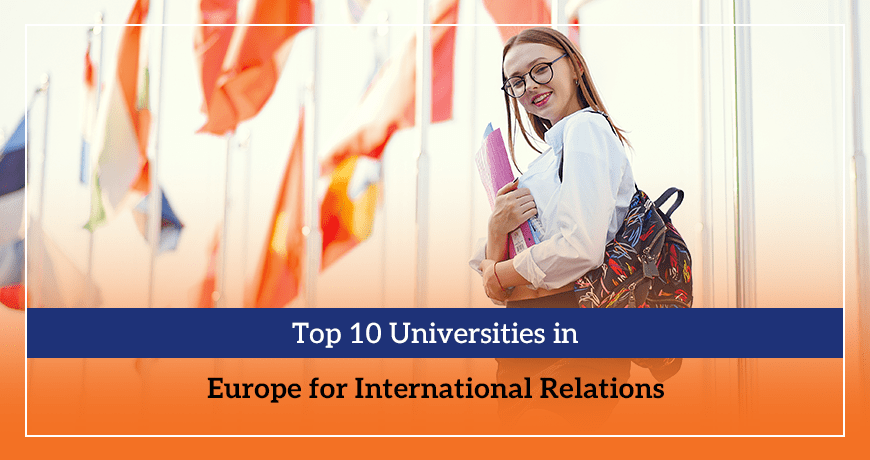What does it mean to understand the world today? Is it enough to know what's happening in your own backyard? Or do we need to cast a wider net to grasp the intricate connections that bind nations together? This is where the study of International Relations (IR) comes in.
In this write-up, we will explore the best universities in Europe for International Relations. Europe, with its storied past and complex present, is a fascinating microcosm of the international system. Its rich history, marked by wars, treaties, and alliances, has shaped the world order as we know it.
Why Study International Relations in Europe?
Studying International Relations in Europe offers a unique and enriching experience. The following are some of the reasons why:
- Access to Leading Institutions: Europe is home to numerous influential international organisations and institutions, including the European Union, NATO, and the Council of Europe. Studying here provides unparalleled access to these organisations, offering opportunities for internships, networking, and firsthand insights into global governance.
- Cultural and Political Diversity: Europe's diverse cultural and political landscape provides a rich learning environment. Studying in Europe exposes you to a variety of perspectives, ideologies, and historical contexts, fostering critical thinking and a nuanced understanding of international relations.
- Multilingual Opportunities: Many European universities offer programs in multiple languages, allowing you to develop language skills and cultural competence. This multilingual education is invaluable for diplomacy, international business, and careers in global organisations.
Criteria for Selecting the Best Universities for International Relations in Europe
Academic Reputation and Faculty Expertise
A university's academic reputation and the expertise of its faculty are crucial factors to consider. Renowned institutions with distinguished professors offer high-quality education and cutting-edge research opportunities. Look for universities with faculty members actively involved in research, publishing in top-tier journals, and contributing to the field of International Relations.
Research Output and Contributions to the Field
A strong research culture is essential for a dynamic and intellectually stimulating learning environment. Universities with a high research output, including publications, conferences, and grants, are committed to advancing knowledge and innovation in International Relations. Consider institutions that are at the forefront of research in areas such as global governance, security studies, and international political economy.
Alumni Network and Career Opportunities
A strong, well-connected alumni network can provide great career opportunities. Look for universities with a large and active alumni base, particularly in the field of International Relations. A well-established alumni network can offer mentorship, job placement assistance, and networking opportunities.
Location and Proximity to International Bodies
The location of a university can significantly impact your learning experience and future career prospects. A city with a strong international presence, such as Brussels, Geneva, or London, offers unique advantages. Proximity to international organisations, embassies, and think tanks provides opportunities for internships, research projects, and networking with policymakers and diplomats.

Top 10 Universities in Europe for International Relations
1. London School of Economics and Political Science (LSE), UK
The LSE's Department of International Relations offers a rigorous and comprehensive program that covers various topics, including international security, global governance, and international political economy. The department boasts a world-class faculty, including renowned scholars like Professor Mary Kaldor and Professor Eric Helleiner. LSE alumni hold influential positions in governments, international organisations, and academia worldwide. The university's recent accolade as the Sunday Times University of the Year 2025 further solidifies its reputation as a leading institution for International Relations.
2. Sciences Po, France
The Paris School of International Affairs (PSIA) at Sciences Po is renowned for its rigorous academic programs and strong emphasis on practical skills. PSIA offers diverse, multilingual programs, including English-taught Master's degrees. The school's location in Paris, a global diplomacy and international relations hub, provides students with unique opportunities for internships, networking, and cultural immersion. Notable alumni of Sciences Po include numerous French presidents, prime ministers, and prominent figures in international organisations.
3. University of Oxford, UK
The Department of Politics and International Relations at the University of Oxford offers various undergraduate and postgraduate programs, including specialised courses in international security, development studies, and global governance. The department's research strengths lie in its interdisciplinary approach, combining theoretical insights with empirical analysis. Oxford's long-standing tradition of academic excellence and its world-class faculty make it a top choice for aspiring international relations scholars.
4. Central European University (CEU), Austria
CEU's Department of International Relations and Global Studies offers unique perspectives on international relations, with a particular focus on Central and Eastern Europe. The programs of this university are designed to equip students with the necessary knowledge and skills to address complex global challenges. CEU's commitment to academic freedom and critical thinking fosters a stimulating learning environment and encourages innovative research.
5. University of Amsterdam, Netherlands
The University of Amsterdam's International Relations program offers many specialisations, including international security, human rights, and global governance. The program is closely integrated with European studies and global politics, providing students with a comprehensive understanding of international affairs. The university's research institutes, such as the Amsterdam Centre for International Relations, provide students with opportunities to participate in cutting-edge research projects.
6. Freie Universität Berlin, Germany
The Centre for Global Politics at Freie Universität Berlin offers a diverse range of programs in International Relations, combining theoretical knowledge with practical skills. The university's strong international focus and location in Berlin, a city with a rich history and a vibrant international community, provide students with unique opportunities for cultural exchange and professional development.
7. Institut Barcelona d'Estudis Internacionals (IBEI), Spain
IBEI offers a range of Master's programs in International Relations and Security, focusing on the Mediterranean region. The institute's multilingual education and strong international partnerships give students a global perspective on international affairs. IBEI's location in Barcelona, a dynamic and cosmopolitan city, offers students a unique cultural experience and opportunities for internships and networking.
8. Graduate Institute of International and Development Studies, Switzerland
The Graduate Institute in Geneva is renowned for its world-class International Relations and Development Studies programs. The institute's proximity to international organisations such as the United Nations and the World Trade Organisation provides students with unparalleled opportunities for internships, networking, and exposure to global policymaking. The institute's research centres, including the Centre for Security Studies and Development Studies, conduct cutting-edge research on various global issues.
9. University of St. Andrews, UK
The School of International Relations at the University of St. Andrews offers a range of undergraduate and postgraduate programs, including specialised courses in international security, international development, and international political economy. The university's strong research culture and thematic centres, such as the Centre for Global Security Studies and the Centre for International Development, provide students with opportunities to engage in cutting-edge research and contribute to global debates.
10. Leiden University, Netherlands
Leiden University's Institute of Political Science and International Relations offers a range of programs, including a Master's degree in International Relations and a Research Master's in Political Science. The institute's focus on global challenges and policy studies equips students with the knowledge and skills to address complex international issues. Leiden University's strong research output and its partnerships with leading international institutions allow students to collaborate with renowned scholars and contribute to advancing knowledge.

Comparison of Top Universities for International Relations
|
University Name
|
Location
|
Program Highlights
|
Notable Alumni
|
Global Ranking
|
|
London School of Economics and Political Science (LSE)
|
UK
|
Renowned faculty, diverse curriculum, strong focus on quantitative methods
|
Multiple Nobel laureates, world leaders, and influential policymakers
|
Top 5 globally
|
|
Sciences Po
|
France
|
Multilingual programs, strong emphasis on practical skills, and close ties to French institutions
|
French presidents, prime ministers, diplomats
|
Top 10 globally
|
|
University of Oxford
|
UK
|
Interdisciplinary approach, world-class faculty, strong research culture
|
Numerous world leaders, Nobel laureates, and influential academics
|
Top 5 globally
|
|
Central European University (CEU)
|
Austria
|
Focus on Central and Eastern Europe, interdisciplinary approach, strong emphasis on critical thinking.
|
Scholars, activists, policymakers
|
Top 100 globally
|
|
University of Amsterdam
|
Netherlands
|
A diverse range of specialisations, a strong research culture, and an international focus
|
Scholars, diplomats, policymakers
|
Top 100 globally
|
|
Freie Universität Berlin
|
Germany
|
Strong international focus, a diverse range of programs, and a focus on practical skills.
|
Scholars, politicians, journalists
|
Top 50 globally
|
|
Institut Barcelona d'Estudis Internacionals (IBEI)
|
Spain
|
Mediterranean focus, multilingual education, strong international partnerships
|
Scholars, diplomats, policymakers
|
Top 100 globally
|
|
Graduate Institute of International and Development Studies
|
Switzerland
|
Focus on international organisations, strong research culture, and interdisciplinary approach.
|
Diplomats, UN officials, policymakers
|
Top 50 globally
|
|
University of St. Andrews
|
UK
|
Strong research culture, a diverse range of programs, and a focus on practical skills.
|
World leaders, diplomats, scholars
|
Top 50 globally
|
|
Leiden University
|
Netherlands
|
Strong research culture, a diverse range of programs, and a focus on global challenges.
|
Scholars, diplomats, policymakers
|
Top 100 globally
|

Factors to Consider When Choosing a University
Program Curriculum and Specialisations
The first step in choosing a university is to identify your specific interests within the field of International Relations. Look for programs that offer a curriculum that aligns with your goals. Consider the core courses, elective options, and opportunities for specialisation. Are you interested in international security, development studies, or global governance? Ensure that the university offers courses and research opportunities in your preferred areas.
Faculty Expertise and Research Interests
A strong faculty can significantly enhance your learning experience. Look for professors who are actively engaged in research, have published in reputable journals, and have a strong track record of mentoring students. Consider the faculty's expertise and research interests. Are they working on topics that align with your research interests? A well-respected faculty can provide valuable guidance and support throughout your academic journey.
Location and Cultural Environment
The location of a university can significantly impact your overall experience. Consider the cultural environment, the city's amenities, and the opportunities for personal and professional growth. A diverse and multicultural environment can broaden your horizons and provide valuable intercultural experiences. Additionally, the proximity to international organisations, embassies, and think tanks can offer unique opportunities for internships, networking, and exposure to global affairs.
Internship and Networking Opportunities
Internships and networking opportunities are important for gaining practical experience and building professional connections. Look for universities with strong partnerships with international organisations, government agencies, and NGOs. These partnerships can give students access to internships, career fairs, and networking events. A strong alumni network can also be a valuable resource for job hunting and career advancement.
Tuition Fees and Scholarship Availability
The cost of education is an important factor to consider when choosing a university. Consider the tuition fees, living expenses, and available scholarships. Some universities offer generous scholarships to international students based on academic merit or financial need. Additionally, consider the cost of living in the city where the university is located.
Tips for Applying to International Relations Programs in Europe
Preparing a Strong Application and Statement of Purpose
A strong application and a compelling statement of purpose are essential for gaining admission to top international relations programs in Europe. Your statement of purpose should clearly articulate your academic and career goals, explain your motivation for pursuing a degree in international relations, and highlight your relevant skills and experiences. Tailor your statement to each program and emphasise how your unique qualifications make you a suitable candidate.
Highlighting Relevant Experience and Language Skills
Highlighting relevant experience and language skills is crucial for a successful application. Any previous internships, volunteer work, or research experience in international relations, diplomacy, or global affairs can significantly strengthen your application. Additionally, proficiency in multiple languages, particularly European ones, can be a major advantage. Consider taking language courses or obtaining language certifications to enhance your language skills.
Understanding Visa Requirements and Application Deadlines
Understanding visa requirements and application deadlines is essential for a smooth application process. Research the specific visa requirements for international students in your chosen country and start the application process well in advance. Be aware of the application deadlines for each program and submit all required documents on time. It is also advisable to consult with the university's international office for any specific guidance or assistance with the visa process.

Frequently Asked Questions
What are the admission requirements for international relations programs in Europe?
Typically, admission requirements include a strong academic background, relevant coursework, language proficiency (especially in English), a strong statement of purpose, and letters of recommendation.
How do European universities rank globally for international relations studies?
Many European universities rank among the top globally for international relations. Institutions like LSE, Sciences Po, Oxford, and others consistently appear in top-tier rankings.
What career opportunities are available after graduating from a European international relations program?
Graduates can pursue careers in diplomacy, international organisations, government agencies, think tanks, NGOs, consulting firms, and academia.
How do tuition fees and living costs compare across top European universities for international relations?
Tuition fees and living costs vary across countries. While some, like Germany, offer affordable or even free education, others, like the UK and Switzerland, have higher costs. Research specific universities and cities for accurate figures.
What are the language requirements for international relations programs in non-English-speaking European countries?
Non-English-speaking European universities often require proficiency in the local language, such as French, German, or Spanish. Some programs may offer English-taught courses, but language proficiency is still beneficial.
Which European universities offer scholarships for international relations students?
Many European universities offer scholarships to international students, both merit-based and need-based. Research specific universities and their scholarship programs.
Conclusion
Studying at the best universities in Europe for International Relations provides a unique opportunity to explore the complexities of global politics, diplomacy, and international organisations. You will gain access to world-class faculty, cutting-edge research, and a diverse international community.
When selecting a program, carefully consider your academic goals and career aspirations. For further guidance, don't hesitate to contact current students, alumni, and university representatives.